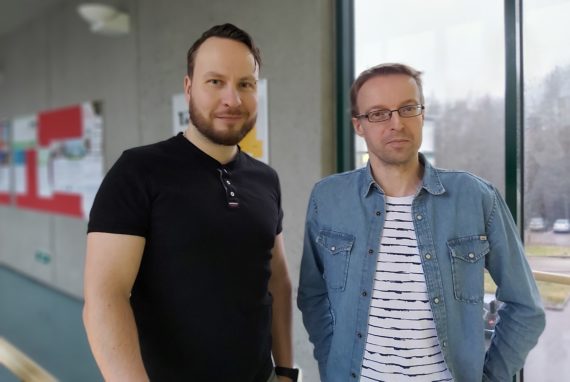Language teachers Mikko Koho and Sami Norrbacka both work at Kotka Campus. We asked their experiences and insights on teaching and language studies. Find out why they think Xamk is an excellent studyplace and why should you study with us.
And yes of course we wanted to know also, what is the best part of being a teacher.

Hi Sami and Mikko! Can you tell us what subjects do you teach?
Sami: I teach communication skills and academic writing. I’ve also taught Finnish as a foreign language but I haven’t been doing that in recent years.
Mikko: Mostly I teach professional English courses to students in the degree programmes of Marine Technology, Marine Engineering and ICT Engineering. Occasionally I have groups from the Logistics and Business Logistics degree programmes as well. Having majored in Russian back in the day, I’m very glad indeed to also have at least one Russian course to teach every year.
Why did you want to be a teacher?
Sami: When I was in high school, we had a brilliant teacher of Finnish, she had a big influence on me. Also, I’ve always loved our language, both in written and spoken variants, so why not have a job as a language teacher?
Mikko: I’ve always been into languages and people. I guess becoming a teacher was my way of getting the bills paid by combining the two.
What is the best part of being a teacher?
Sami: I have wonderful students and wonderful colleagues. In my job I get to meet a lot of people, I think that’s one of the best parts of my job. I also like the fact that when I have a day with no lessons, I can work from my home office and play (rock) music loud if I want to. Usually I want to.
Mikko: By far, being the teacher in the sense I learned a teacher to be as a profession some 20 years ago. Today, I’d say that’s about 40% of the time. Wouldn’t like it to get much lower than that.
Your typical day at Xamk?
Sami: If I have a morning class, I teach my students until it is time for lunch. Then I read and answer my emails, read theses and assignments and prepare my lessons, then go home. If I have an afternoon class, I’ll do all the reading and preparations before lunch. If I don’t have lessons, I’ll usually work from my home office, reading emails, theses and assignments and preparing my lessons. On some days I have meetings organized and attended via Microsoft Teams or Skype.
Mikko: In any given order: prepare lessons and materials and assignments, teach, operate on Moodle/Learn, operate by email, translate and proof-read, check students’ assignments/abstracts/theses, operate on various and regularly changing administrative virtual platforms, attend meetings.
Many potential students are thinking about applying to Xamk. Why should they study at Xamk/with us?
Sami: We have really high-skilled teachers, and the students have a lot of great activities outside of school. We have a happy educational community, we are a modern, international university of applied sciences and we have a lot of wonderful programmes where you can learn to be the best in the field of studies you choose.
Mikko: We have truly competent staff that are working to maintain high-quality tuition and student services. If you are studying what you want to be studying at Xamk, at least most of the time you’ll get what you need.
Can you tell us little bit about language studies at Xamk?
Mikko: For students with a background in the Finnish primary and secondary education, the basic deal is one course of professional Swedish and one course of professional English, each of these equaling 5 ECTS credits, and some amount of professional Finnish communication studies. In some degree programmes, there are more mandatory English courses down the road. As part of their elective studies, students may take in-class courses of Russian, German, Italian, Spanish, French and Chinese. The available selection varies between campuses. Many of these languages can also be studied outside the classroom by means of online and e-campus courses. As for professional English courses, they are, as a rule, also suitable for non-Finnish speaking students since typically the language of instruction is English.
Sami: Mikko answered this question so profoundly that I think he deserves a medal!
Thank you and see you later!
